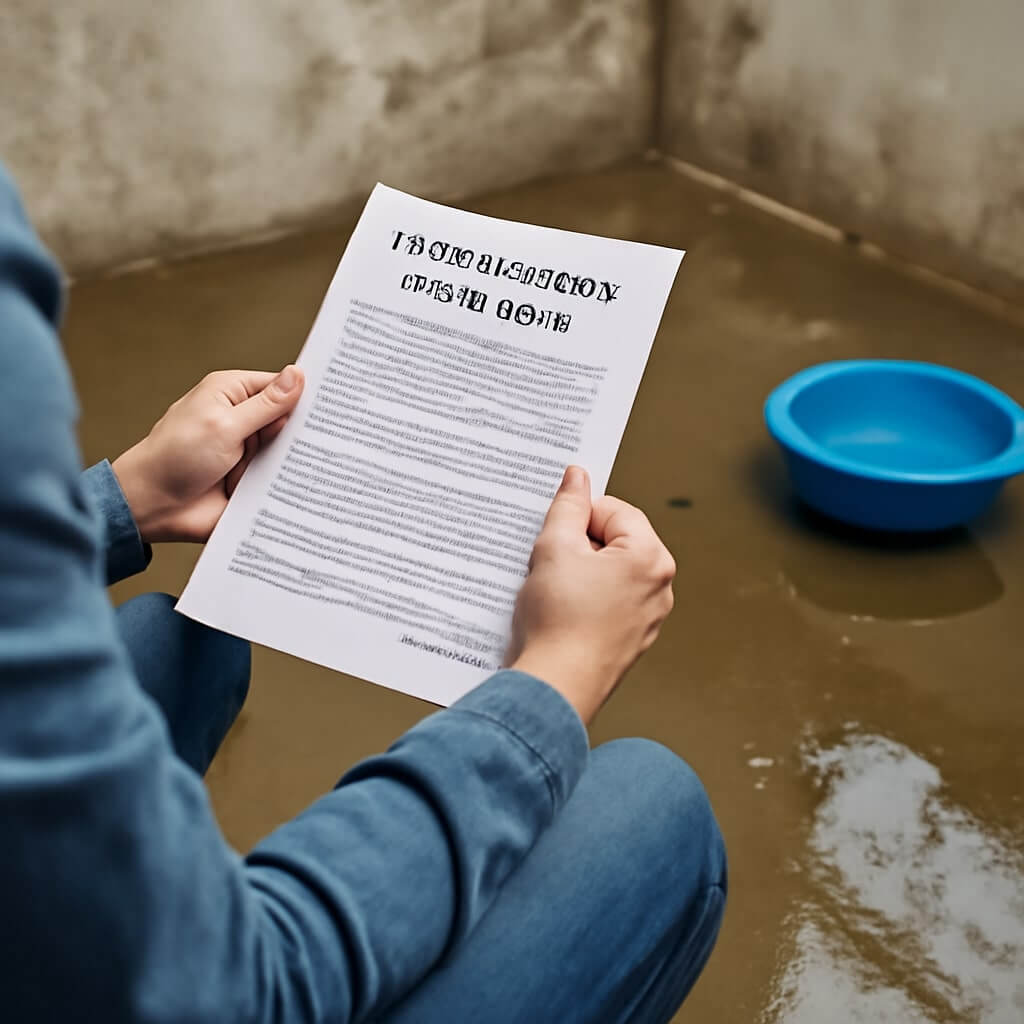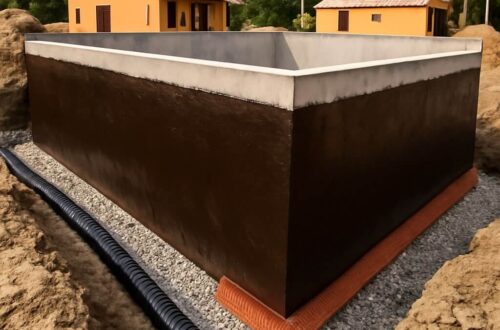When it comes to your homeowners insurance, understanding how basement waterproofing fits into your coverage is vital. Many policies have specific clauses regarding water damage, and knowing these can save you from costly surprises later. It’s important to clarify terms, exclusions, and potential discounts with your insurance agent. But how can you guarantee your waterproofing efforts are recognized? Let’s explore the steps you need to take to secure your coverage effectively.
Key Takeaways
- Review your homeowners insurance policy for specific coverage details related to basement waterproofing and water damage.
- Contact your insurance agent to ask about coverage for waterproofing and any exclusions that may apply.
- Request documentation or endorsements that confirm waterproofing is recognized in your policy for claims.
- Inquire about any discounts available for homes with waterproofed basements to enhance financial protection.
- Keep records of all waterproofing efforts and correspondence with your insurer for future reference and claims support.
Understanding Homeowners Insurance Basics
Homeowners insurance is your safety net, protecting you from financial loss due to various unforeseen events, such as fire, theft, or natural disasters. Understanding the basics is vital for safeguarding your investment.
Typically, your policy includes dwelling coverage, personal property protection, and liability coverage. It’s important to be aware of your coverage limits, as they determine the maximum payout in the event of a claim.
Review your policy regularly to confirm it meets your current needs and reflects any home improvements. Knowledge of these fundamentals helps you make informed decisions and guarantees you’re adequately covered when unexpected situations arise.
Types of Water Damage Covered by Homeowners Insurance
When evaluating your homeowners insurance, it’s essential to understand the types of water damage typically covered.
Common scenarios like burst pipes or heavy rain can trigger claims, but there are also specific exclusions you should be aware of.
Familiarizing yourself with the claim process will help guarantee you’re prepared should the need arise.
Common Water Damage Scenarios
While many homeowners may not realize it, various types of water damage can greatly impact your property and finances.
Common scenarios include burst pipes, which can lead to significant interior flooding, particularly in areas with inadequate drainage systems. Additionally, heavy rainfall in flood zones can overwhelm your home’s defenses, causing water to seep into the basement.
Furthermore, appliance failures, like a malfunctioning washing machine, may also result in costly water damage.
Understanding these scenarios helps you recognize the importance of homeowners insurance in covering such incidents, ultimately protecting your investment and ensuring your peace of mind.
Exclusions in Coverage Policies
Understanding the exclusions in your homeowners insurance policy is essential, especially since not all types of water damage are covered.
Familiarizing yourself with these exclusion types can help you avoid surprises down the line. Here are some common policy limitations:
- Flood damage from natural disasters
- Water backup from sewers or drains
- Negligence or lack of maintenance
- Damage from freezing pipes not properly insulated
- Mold growth due to prolonged moisture exposure
Claim Process Essentials
Maneuvering through the claim process for water damage can be intimidating, but knowing the types of water damage typically covered by homeowners insurance can simplify your experience. Start by gathering your claim documentation to support your request. Below is a breakdown of common water damage types:
| Type of Water Damage | Typically Covered | Notes |
|---|---|---|
| Burst Pipes | Yes | Requires prompt reporting |
| Roof Leaks | Yes | Coverage varies by policy |
| Flooding from Heavy Rain | Often No | Check for flood insurance |
Always perform coverage verification with your insurer to verify you’re adequately protected.
Common Exclusions in Homeowners Insurance Policies
When reviewing your homeowners insurance, it’s essential to understand the common exclusions that may affect your basement waterproofing coverage.
Many policies limit water damage claims, particularly those related to maintenance issues or gradual leaks.
Additionally, if you live in a flood-prone area, you may need separate flood insurance to fully protect your property against water damage.
Water Damage Limitations
While you might assume that your homeowners insurance covers all types of water damage, many policies include significant exclusions that can leave you vulnerable.
Understanding these insurance limitations is essential for proper coverage. Here are common exclusions you should be aware of:
- Water damage from flooding or heavy rain
- Maintenance issues, like leaks from aging pipes
- Damage from sewer backups
- Negligence or lack of proper home maintenance
- Mold or mildew resulting from prolonged water exposure
Review your policy carefully to guarantee you’re adequately protected against these potential pitfalls.
Flood Insurance Requirements
Many homeowners are surprised to learn that standard homeowners insurance typically doesn’t cover flood damage. To protect your property, you’ll need separate flood policies, which are specifically designed to address this risk.
These policies often require a risk assessment to determine your home’s vulnerability to flooding. Factors such as location, elevation, and historical flood data play an essential role in this evaluation.
Without flood insurance, you could face significant out-of-pocket expenses in the event of water damage from rising waters. Always consult with your insurance agent to understand your coverage options and guarantee you’re adequately protected against flooding risks.
How Basement Waterproofing Affects Insurance Claims
Understanding how basement waterproofing affects insurance claims is essential for homeowners. Proper waterproofing can lead to several insurance-related advantages, impacting both your claims and premiums. Here are key points to take into account:
- Reduced Risk: Waterproofing minimizes the likelihood of water damage claims.
- Lower Premiums: Insurers may offer discounts for waterproofed basements.
- Increased Home Value: A waterproofed basement can enhance your property’s marketability.
- Claim Approval: Waterproofing may simplify the claims process for water-related damages.
- Peace of Mind: Knowing your home is protected can reduce stress.
Reviewing Your Insurance Policy for Coverage Details
To guarantee your basement waterproofing is covered, you need to carefully review your insurance policy for specific inclusions and exclusions.
Pay close attention to how your policy defines water damage, as this will directly impact your coverage.
Understanding these details helps you identify any potential gaps in protection.
Policy Exclusions and Inclusions
When you review your insurance policy, it’s essential to pinpoint the specific inclusions and exclusions related to basement waterproofing coverage. Understanding these policy details helps you guarantee you’re adequately protected.
Pay close attention to:
- Coverage limits for water damage
- Specific exclusions for natural disasters
- Requirements for waterproofing installations
- Additional endorsements needed for thorough coverage
- Any limitations on repair costs
Water Damage Definitions
Clarity regarding water damage definitions in your insurance policy is essential for ensuring you’re fully protected against potential basement flooding.
You should familiarize yourself with various water damage types, including sudden incidents like burst pipes and gradual issues such as seepage. Each of these falls under specific insurance definitions that dictate coverage eligibility.
Review your policy for terms like “sudden and accidental” versus “gradual damage,” as this can greatly impact your claims. Understanding these nuances helps you determine what’s covered, allowing you to take proactive measures to safeguard your home against water-related issues effectively.
The Role of Home Inspections in Insurance Coverage
While home inspections may seem like just another step in the purchasing process, they play an essential role in determining your insurance coverage, especially regarding basement waterproofing.
Understanding the home inspection importance can safeguard your investment. The inspection report significance is paramount, as it highlights potential issues that insurers might consider when evaluating coverage.
Understanding the significance of home inspections is crucial for protecting your investment and ensuring adequate insurance coverage.
- Identifies pre-existing water damage
- Assesses the effectiveness of existing waterproofing
- Documents structural integrity
- Provides a basis for negotiating repairs
- Influences premium rates and coverage options
A thorough inspection can guarantee you’re well-informed about your property’s risks, making it critical for securing adequate insurance.
Documenting Water Damage and Waterproofing Efforts
To guarantee your basement waterproofing efforts are properly covered by insurance, it’s crucial to document any water damage and the steps you’ve taken to mitigate it. Start by taking clear photos of affected areas and keep records of any repairs. Use the following table to track your water damage documentation and waterproofing efforts:
| Date | Description of Damage |
|---|---|
| YYYY-MM-DD | Brief description of damage |
| YYYY-MM-DD | Waterproofing action taken |
| YYYY-MM-DD | Follow-up inspection results |
This structured approach will provide your insurer with the necessary evidence to support your claim and guarantee your waterproofing efforts are recognized.
Working With Your Insurance Agent for Clarification
After documenting your water damage and waterproofing efforts, it’s time to engage with your insurance agent for a better understanding of your coverage.
Use this opportunity to clarify any insurance terminology and guarantee you grasp your policy comparison.
Clarify insurance terminology to ensure you fully understand your policy comparison and coverage details.
- Ask about specific coverage for basement waterproofing.
- Inquire about exclusions that may affect your claim.
- Request examples of successful claims related to water damage.
- Discuss the process for filing a claim if needed.
- Guarantee you understand the limits and deductibles involved.
This dialogue will empower you to make informed decisions about your homeowners insurance.
Tips for Filing a Claim for Water Damage
How can you effectively navigate the claims process for water damage? Start with water damage preparedness—document everything. Take photos of the damage and keep receipts for repairs. Notify your insurance company as soon as possible, providing all necessary details.
Here’s a quick reference table for your insurance claim tips:
| Action | Details |
|---|---|
| Document Damage | Photos, videos, receipts |
| Notify Insurance | Call promptly, provide details |
| File Claim | Follow up, keep records |
| Repair Safely | Use licensed professionals |
Following these tips guarantees smoother handling of your claim.
Additional Coverage Options for Enhanced Protection
While standard home insurance policies often cover basic water damage, exploring additional coverage options can provide enhanced protection for your basement.
Consider these insurance endorsements to fortify your coverage:
- Sump Pump Coverage: Protects against failures and related water damage.
- Flood Insurance: Essential if you’re in a flood-prone area.
- Water Backup Coverage: Covers damages from sewer backups.
- Enhanced Liability Protection: Safeguards against lawsuits from water-related incidents.
- Home Warranty Plans: Covers repairs for water-damaged systems.
Conclusion
Confirming your basement waterproofing coverage with homeowners insurance is essential for protecting your investment. By reviewing your policy, discussing details with your insurance agent, and documenting your waterproofing efforts, you can clarify your coverage and avoid surprises during claims. Make certain to ask about potential discounts for your waterproofing measures, as these can enhance your protection. Staying proactive and informed will help guarantee you’re adequately covered against water damage in your home.






